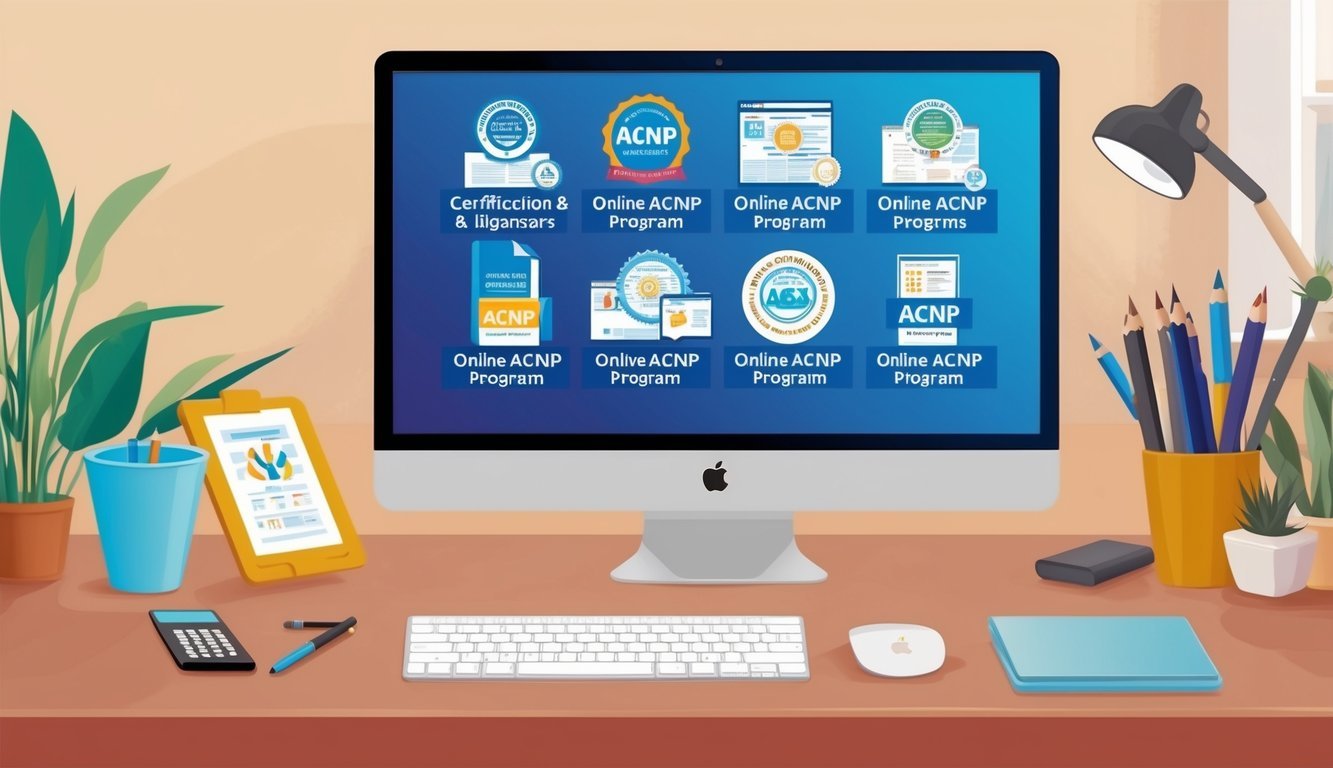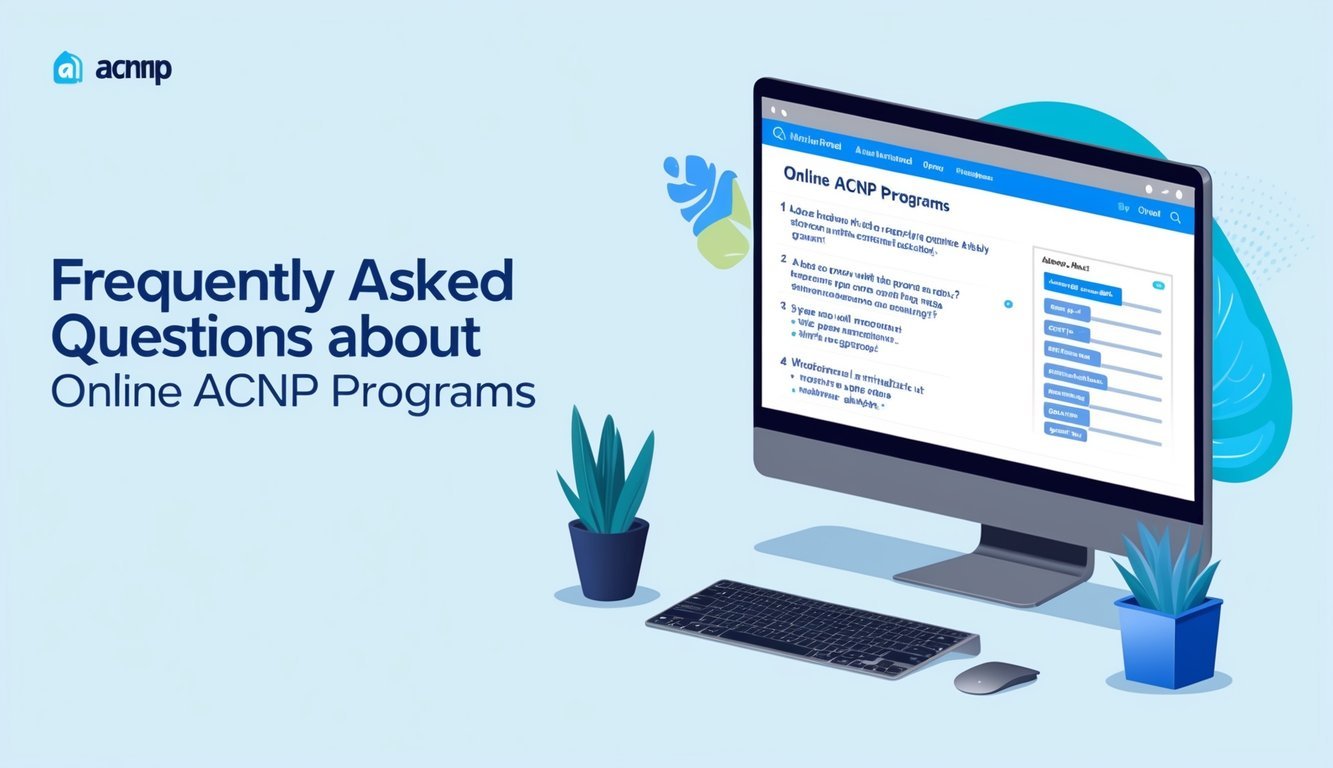As healthcare continues to evolve, the role of the Acute Care Nurse Practitioner (ACNP) has become increasingly vital. Online ACNP programs offer a flexible pathway for registered nurses seeking to advance their careers in acute care settings.
These programs provide the necessary education and training to enhance your skills and knowledge, enabling you to deliver high-quality patient care.
Choosing the right online program is crucial for your success.
Many programs offer various specializations, curriculum options, and clinical experiences to ensure you are well-prepared for the demands of acute care.
With proper guidance, you can find a program that fits your schedule and career goals while allowing you to maintain work-life balance.
You are not just signing up for classes; you are stepping into a rewarding career that makes a difference in people’s lives.
By enrolling in an online ACNP program, you are positioning yourself in a growing field with diverse opportunities.
Key Takeaways
- Online ACNP programs provide flexible educational pathways for nurses.
- Proper program selection is essential for achieving career goals in acute care.
- ACNP roles are vital for delivering advanced nursing practice in healthcare settings.
Understanding Acute Care Nurse Practitioner (ACNP) Roles
Acute Care Nurse Practitioners (ACNPs) play a vital role in healthcare, focusing on the management of patients with acute and chronic illnesses.
They are equipped with advanced training to provide comprehensive care.
Here are key aspects of their roles.
Scope of Practice for ACNPs
The scope of practice for ACNPs includes diagnosing and treating patients with complex health issues.
They conduct comprehensive assessments and create tailored care plans.
ACNPs can perform various medical procedures, prescribe medications, and interpret diagnostic tests.
The role requires a strong understanding of acute care concepts and protocols.
Some key responsibilities include:
- Assessment and Diagnosis: Evaluating a patient’s condition through physical exams and medical histories.
- Treatment Plans: Formulating and implementing care strategies based on patient needs.
- Patient Education: Informing patients and families about health conditions and treatment options.
According to the American Association of Critical-Care Nurses, ACNPs have a significant impact on improving patient outcomes through their specialized skills.
Critical Care and Patient Management
ACNPs often work in critical care settings, managing patients with severe medical conditions.
Their expertise is crucial in hospitals, emergency rooms, and urgent care facilities.
You will find them playing a role in stabilizing patients, especially in high-stress situations.
Patient management includes:
- Continuous Monitoring: Keeping a close watch on patients’ vital signs.
- Collaborative Care: Working with healthcare teams to ensure coordinated treatment.
- Emergency Response: Acting quickly to address life-threatening situations.
Mastering these areas enhances patient care and supports better recovery outcomes for those facing acute health challenges.
The Importance of Accreditation
Accreditation is essential for ACNP programs, ensuring quality education and training.
Accredited programs meet specific standards set by professional organizations.
This process confirms that graduates are well-prepared to enter the healthcare field.
Key points about accreditation include:
- Quality Assurance: Accreditation bodies assess programs to ensure they meet educational and clinical standards.
- Career Advancement: Graduating from an accredited program can improve employment opportunities and options for further education.
- Regulatory Compliance: Accreditation helps ensure that programs comply with state and national laws.
Programs like the one at UConn emphasize accreditation, emphasizing their commitment to providing high-quality education for future ACNPs.
Educational Pathways to ACNP
There are several educational pathways to becoming an Acute Care Nurse Practitioner (ACNP).
These options cater to different academic backgrounds and career goals, providing flexible routes to this rewarding role in healthcare.
From BSN to MSN Programs
If you have a Bachelor’s in Nursing (BSN), pursuing a Master of Science in Nursing (MSN) is a common pathway.
Most accredited MSN programs offer specialized training for ACNP.
You will typically engage in coursework that covers acute care principles, advanced health assessment, and pharmacology.
Programs often combine online learning with in-person clinical experiences, ensuring you gain the necessary hands-on skills.
Courses usually require you to complete a specific number of clinical hours, which can range from 500 to 700, depending on the program.
Look for programs that prepare you for national board certification once you graduate, enabling you to practice as an ACNP.
Advanced Standing in DNP Programs
For those seeking a Doctor of Nursing Practice (DNP) degree, advanced standing is available if you already hold an MSN.
DNP programs focus on leadership in clinical practice and often require fewer credits for those with an MSN.
You can typically expect to take about 35 to 50 credits over the course of the program.
Clinical practice hours are also required, allowing you to apply your advanced training in real-world settings.
Some programs offer flexibility with online courses, making it easier to balance work and study.
Choosing a DNP program with a pathway to ACNP will help you advance your career and expand your clinical capabilities.
Bridge Programs for Non-ACNPs
Bridge programs are designed for RNs with a non-ACNP background who wish to transition into this field.
These programs often accept candidates with a variety of nursing degrees and provide the necessary coursework to prepare for ACNP roles.
You may find options like the RN to MSN or RN to DNP, which allow you to earn your master’s or doctorate while meeting ACNP requirements.
These programs typically include foundational courses in acute care, as well as advanced clinical training.
They often require additional clinical hours but simplify the transition for those new to acute care settings.
Research programs that offer a clear pathway for certification upon completion to ensure your investment leads to professional advancement.
Essential Online ACNP Program Components

When considering online Acute Care Nurse Practitioner (ACNP) programs, it’s vital to focus on key components that shape your education.
From coursework to clinical experience, understanding these elements will help you select the right program for your goals.
Coursework and Specializations
ACNP programs offer a variety of coursework tailored to your specialization, whether in adult-gerontology or pediatric care.
Common courses include advanced physiology, pathophysiology, and pharmacology.
You may also encounter specialized topics like critical care or geriatrics based on your track.
Many programs incorporate a mix of theoretical learning and practical applications.
This might involve case studies and simulations to prepare you for real-world scenarios.
Some institutions also provide options for dual degrees, allowing you to merge specialties.
Example Course Structure:
| Course Title | Credits |
|---|---|
| Advanced Health Assessment | 3 |
| Adult-Gerontology Theory | 3 |
| Pediatric Acute Care Focus | 3 |
| Evidence-Based Practices | 3 |
Opting for programs that offer diverse specializations can enhance your competitive edge in the job market.
Clinical Experience and Placements
Clinical experience is a critical component of ACNP programs.
Most schools require a significant number of clinical practicum hours to ensure you are well-prepared for practice.
Expect to complete anywhere from 500 to 1,000 hours of hands-on training in various healthcare settings.
Placement opportunities are designed to expose you to real patients under the guidance of experienced mentors.
This experience builds your ability to assess patient conditions and adapt care plans effectively.
Finding programs that boast strong partnerships with healthcare facilities can optimize your clinical placement experiences.
These connections often lead to more extensive networking and job opportunities after graduation.
Integration of Evidence-Based Practice
Evidence-based practice (EBP) is essential in nursing education.
ACNP programs emphasize applying the latest research in clinical decision-making.
You will learn to evaluate research, integrate findings into your practice, and assess patient outcomes.
This integration of EBP equips you with the tools to provide informed care.
Programs often include coursework specifically focused on research methodologies, critical appraisal, and translating evidence into practice.
Many schools also encourage capstone projects or research proposals that require you to explore a clinical question related to acute care.
This experience not only solidifies your EBP skills but also showcases your ability to contribute to the nursing field.
Certification and Licensure

Obtaining certification and licensure is essential for your career as an Acute Care Nurse Practitioner (ACNP).
These steps ensure that you meet the necessary professional standards and are legally permitted to practice in your state.
National Certification Examinations
To become an ACNP, you must pass a national certification exam.
The primary organizations offering these exams are:
| Exam Title | Certifying Body |
|---|---|
| Adult-Gerontology Acute Care Nurse Practitioner | American Nurses Credentialing Center (ANCC) |
| Pediatric Acute Care Nurse Practitioner | Pediatric Nursing Certification Board (PNCB) |
These exams evaluate your knowledge and skills in acute care settings.
Once you pass, you earn credentials like ACNPC-AG, which enhances your professional credibility.
State Licensure Requirements
After obtaining national certification, you need state licensure to practice.
Each state has different requirements, but common steps include:
- Application: Submit an application to your state nursing board.
- Proof of Certification: Provide proof of your national certification.
- Background Check: Undergo a criminal background check.
Some states may also require additional coursework or examinations, so always check your state’s specific rules.
For detailed state requirements, visit the National Council of State Boards of Nursing.
Continuous Professional Development
Maintaining your certification and licensure requires ongoing education.
Most certification bodies mandate a certain number of continuing education (CE) hours every few years.
This may include:
- Workshops: Attend hands-on workshops in specialized areas.
- Online Courses: Complete online CE courses at your convenience.
- Conferences: Participate in nursing conferences for networking and learning.
Staying current not only helps you provide the best care but also ensures compliance with renewal requirements.
Check with your certifying body, such as the ANCC or the CNP, for specifics on CE requirements.
Selecting the Right Online ACNP Program

When choosing an online Acute Care Nurse Practitioner (ACNP) program, it is essential to focus on several critical factors.
These include the program’s accreditation, its reputation, considerations for length and cost, and the technology and support services offered.
Understanding these factors can help you make an informed decision.
Program Accreditation and Reputation
When selecting your ACNP program, make sure the program is accredited by a recognized body, such as the Commission on Collegiate Nursing Education (CCNE) or the Accreditation Commission for Education in Nursing (ACEN).
This ensures that the program meets high standards of quality.
A reputable program can enhance your career opportunities.
Institutions like Duke University and Vanderbilt University are well-known for their nursing programs.
Researching how graduates perform on certification exams can also provide insights into a program’s effectiveness.
Considerations for Program Length and Cost
The length of the program can greatly affect your lifestyle and financial situation.
Most online ACNP programs require 40 to 80 credits and can take anywhere from 1 to 3 years to complete.
Programs like the one at the University of South Carolina offer flexible, hybrid options that combine online and on-site learning.
Cost is another vital consideration.
The average tuition for an ACNP program can range from $25,000 to $50,000.
Make sure to research financial aid options, including grants and scholarships offered by schools like Maryville University.
Assessing Technology and Support Services
Effective online learning depends on strong technological support.
Check if the program uses a user-friendly online platform for lectures and assignments.
Systems that offer 24/7 technical support can help ease any challenges you might encounter.
Support services, like academic advising and access to libraries, are also crucial.
Look for programs that provide robust student resources, including networking opportunities and career services.
Institutions like Georgetown University focus on providing extensive support to help you succeed in your studies and future career.
Frequently Asked Questions

If you are considering an online Acute Care Nurse Practitioner (ACNP) program, you may have specific questions.
This section addresses common queries related to program options, affordability, pathways, and state-specific variations.
What are the top online programs for becoming an Acute Care Nurse Practitioner?
Several online programs stand out for their quality and reputation.
Notable programs include those offered by Georgetown University, Vanderbilt University, and Duke University.
These institutions provide strong academic support and clinical experiences.
Which online Acute Care Nurse Practitioner programs are the most affordable?
Affordability is important when choosing a program.
Some of the more cost-effective programs include the University of Michigan with competitive tuition rates for residents and non-residents.
It’s a good idea to compare tuition costs and financial aid options.
Are there online Post-Master’s Acute Care Nurse Practitioner programs available?
Yes, several institutions offer online Post-Master’s ACNP programs.
These programs are designed for nurses already holding a master’s degree who wish to specialize in acute care.
Check with universities like Nurse Journal to explore available options.
What options exist for BSN to AGACNP online programs?
There are multiple pathways for Registered Nurses (RNs) with a Bachelor of Science in Nursing (BSN) to become Adult-Gerontology Acute Care Nurse Practitioners (AGACNP).
Programs like the one at the University of South Alabama offer BSN to DNP options, incorporating both specialties of Family Nurse Practitioner and Acute Care Nurse Practitioner.
How do Acute Care Nurse Practitioner programs vary by state, such as those in California?
Each state has unique requirements for ACNP programs, especially in California.
It’s crucial to check the California Board of Registered Nursing for specific guidelines, certification requirements, and program approvals.
These factors can significantly influence your education and practice.
What are the pathways for a Family Nurse Practitioner to specialize in acute care?
FNPs can transition into acute care through specialized training and certification programs.
Many universities offer dual FNP/ACNP programs.
These programs allow you to gain skills in both areas.
Consider programs like the one at the University of South Alabama for a comprehensive approach.

